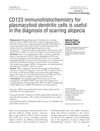 20 citations,
May 2016 in “Journal of Cutaneous Pathology”
20 citations,
May 2016 in “Journal of Cutaneous Pathology” Using CD123 to detect certain immune cells helps diagnose a type of hair loss condition.
 20 citations,
October 2013 in “British Journal of Dermatology”
20 citations,
October 2013 in “British Journal of Dermatology” The document concludes that clinicians should be aware of common hair and scalp disorders in women of African descent and that more research is needed to develop effective treatments.
 20 citations,
July 2008 in “Dermatologic Therapy”
20 citations,
July 2008 in “Dermatologic Therapy” The document says that treating the root cause of hair follicle damage is crucial to prevent permanent hair loss, and treatment options vary.
 20 citations,
May 1992 in “The Journal of Dermatologic Surgery and Oncology”
20 citations,
May 1992 in “The Journal of Dermatologic Surgery and Oncology” Dr. Norwood's analysis highlights the need for careful patient selection and strategic hair transplant design to create a natural-looking hair density.
 19 citations,
April 2019 in “Journal of the European Academy of Dermatology and Venereology”
19 citations,
April 2019 in “Journal of the European Academy of Dermatology and Venereology” Acne lesions start with changes in hair follicles and increase in inflammation, suggesting a cycle that could affect treatment strategies.
 19 citations,
October 2013 in “Headache: The Journal of Head and Face Pain”
19 citations,
October 2013 in “Headache: The Journal of Head and Face Pain” The document concludes that inhalation of oxygen and sumatriptan injections are primary for cluster headaches, indomethacin for paroxysmal hemicrania, and lidocaine and lamotrigine for SUNCT, but SUNCT often resists treatment.
 19 citations,
January 2012 in “Dermato-endocrinology”
19 citations,
January 2012 in “Dermato-endocrinology” Moderately high prolactin levels do not cause hair loss in women.
 19 citations,
August 2011 in “Facial Plastic Surgery Clinics of North America”
19 citations,
August 2011 in “Facial Plastic Surgery Clinics of North America” Hair grafting is a key method for improving scars, especially in areas with hair, by transplanting hair to hide the scar while maintaining its original characteristics.
 19 citations,
February 2008 in “Facial Plastic Surgery”
19 citations,
February 2008 in “Facial Plastic Surgery” The article concludes that microvascular free flaps, especially the latissimus dorsi flap, are recommended for large scalp reconstructions, and hair transplantation offers high survival rates and excellent aesthetic results.
 19 citations,
January 2001 in “Dermatology + psychosomatics”
19 citations,
January 2001 in “Dermatology + psychosomatics” The review concluded that male pattern baldness is mostly seen negatively, affecting attractiveness and social appeal.
 19 citations,
March 1988 in “International Journal of Dermatology”
19 citations,
March 1988 in “International Journal of Dermatology” Hair shaft dysplasias are abnormal hair conditions that can be inherited or acquired and may signal other health issues, with limited treatment options available.
 18 citations,
March 2018 in “Archives of Plastic Surgery”
18 citations,
March 2018 in “Archives of Plastic Surgery” The superficial temporal artery flap is a reliable method for reconstructing complex facial defects with minimal complications.
 18 citations,
May 2017 in “Head & Neck”
18 citations,
May 2017 in “Head & Neck” Free tissue transfer is highly effective for fixing exposed implants after skull surgery.
 18 citations,
January 2017 in “Journal der Deutschen Dermatologischen Gesellschaft”
18 citations,
January 2017 in “Journal der Deutschen Dermatologischen Gesellschaft” High and low doses of prednisolone helped 62% of children with severe alopecia regrow hair with some weight gain and mild acne as side effects.
 18 citations,
May 2015 in “Australasian Journal of Dermatology”
18 citations,
May 2015 in “Australasian Journal of Dermatology” Serenoa repens extract in topical products improves hair growth and appearance in male pattern baldness with mild side-effects.
 18 citations,
December 2014 in “Plastic surgery”
18 citations,
December 2014 in “Plastic surgery” Follicular Unit Transplantation is an effective and safe treatment for hair loss due to scarring.
 18 citations,
January 2013 in “Postepy Dermatologii I Alergologii”
18 citations,
January 2013 in “Postepy Dermatologii I Alergologii” Puberty often causes skin issues like acne and excessive sweating, and treatments require patience as results may vary.
 18 citations,
March 2008 in “British Journal of Dermatology”
18 citations,
March 2008 in “British Journal of Dermatology” Finasteride works better for hair loss in patients 26 or younger.
 18 citations,
December 2006 in “Clinical dysmorphology”
18 citations,
December 2006 in “Clinical dysmorphology” A 2-year-old boy with a rare brain malformation may have Gomez–López-Hernández syndrome.
 18 citations,
January 2004 in “Dermatologic Clinics”
18 citations,
January 2004 in “Dermatologic Clinics” Skin problems in older people can indicate hormonal diseases, nutritional deficiencies, or conditions like diabetes, menopause, and HIV.
 18 citations,
January 1999 in “CNS Drugs”
18 citations,
January 1999 in “CNS Drugs” Some anticonvulsant drugs can cause skin reactions, ranging from mild to severe, and managing these reactions is important for patient care.
 17 citations,
February 2018 in “Journal of Cosmetic and Laser Therapy”
17 citations,
February 2018 in “Journal of Cosmetic and Laser Therapy” The QR 678 hair growth treatment was safe and effective for hair regrowth in men and women.
 17 citations,
October 2017 in “Journal of Cutaneous Medicine and Surgery”
17 citations,
October 2017 in “Journal of Cutaneous Medicine and Surgery” No treatment has been proven to effectively stop hair loss or regrow hair in Frontal Fibrosing Alopecia, and more research is needed.
 17 citations,
September 2017 in “Journal of Cosmetic Dermatology”
17 citations,
September 2017 in “Journal of Cosmetic Dermatology” Women with PCOS in North China often have hirsutism and acne, with hirsutism linked to metabolic issues.
 17 citations,
June 2017 in “British Journal of Dermatology”
17 citations,
June 2017 in “British Journal of Dermatology” The article concludes that hair loss is a common side effect of drugs treating skin cancer by blocking the hedgehog pathway, but treatment should continue, and more selective drugs might prevent this side effect.
 17 citations,
August 2015 in “Expert Opinion on Pharmacotherapy”
17 citations,
August 2015 in “Expert Opinion on Pharmacotherapy” The document concludes that oral finasteride and topical minoxidil are effective for genetic hair loss, while other treatments for different types of hair loss show promise but need more research.
 17 citations,
May 2015 in “Aesthetic Plastic Surgery”
17 citations,
May 2015 in “Aesthetic Plastic Surgery” FUE hair transplantation using a micromotor is effective and gives natural results with few complications.
 17 citations,
June 2011 in “Dermatologic Surgery”
17 citations,
June 2011 in “Dermatologic Surgery” Hair transplantation is an effective way to restore eyebrows.
 17 citations,
January 2011 in “The Korean Journal of Hepatology”
17 citations,
January 2011 in “The Korean Journal of Hepatology” Vogt-Koyanagi-Harada disease can develop during interferon therapy for chronic hepatitis C.
 17 citations,
January 2006 in “Veterinary Dermatology”
17 citations,
January 2006 in “Veterinary Dermatology” Topical melatonin and brushing did not affect hair regrowth in Siberian Huskies.






























